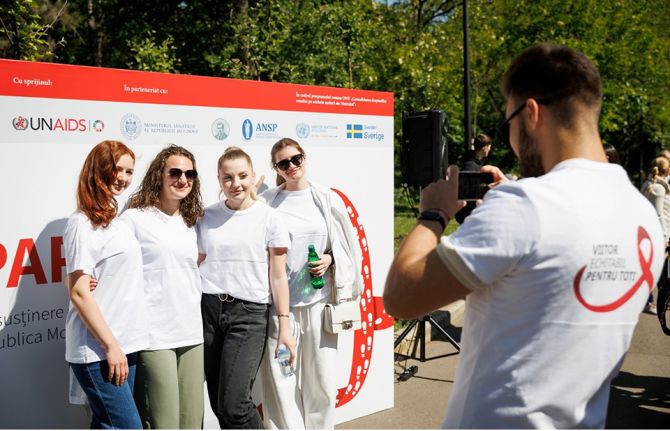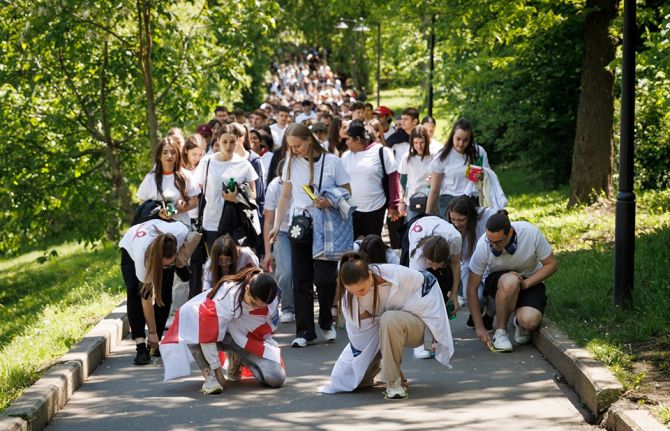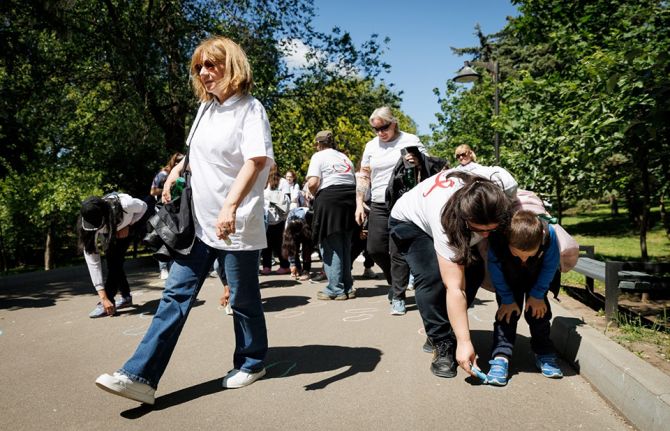




Feature Story
Towards stigma-free healthcare for people living with HIV in Moldova
23 May 2025
23 May 2025 23 May 2025In the heart of Chișinău, Moldova, medical students, healthcare workers, civil society members, and representatives of the international community took a symbolic step toward a more inclusive, respectful, and stigma-free health system.
To commemorate International AIDS Candlelight Memorial Day and under the theme of “In Their Shoes”, the event was organized by UNAIDS in partnership with the Association of Medical Students and Residents, the Nicolae Testemițanu State University of Medicine and Pharmacy and the Ministry of Health of the Republic of Moldova. The event marked a growing movement to end HIV-related stigma in Moldova’s healthcare system—a transformation already underway in medical education.
Since 2023, the Nicolae Testemițanu State University of Medicine and Pharmacy, with technical support from UNAIDS and financial backing from the Embassy of Sweden, has introduced Human Rights in Healthcare as a compulsory course across all faculties. Rather than remaining a stand-alone subject, human rights principles are now embedded in core clinical disciplines such as surgery, gynecology, oncology, infectious diseases, and family medicine, including training on how to treat people living with HIV and members of key populations.
“Patients today are more informed. They understand their rights,” said Dr Virginia Salaru,
vice-director of the Didactic and Academic Quality Management Department and Associate Professor. “And medical professionals must be ready, not just scientifically, but ethically.”
This reform is timely. Despite progress in HIV prevention and treatment, stigma in healthcare remains a major barrier. According to the Stigma Index 2.0, people living with HIV, especially those from key populations such as people who use drugs, sex workers, men who have sex with men, and transgender people, continue to face breaches of confidentiality, avoidance by medical staff, and discriminatory treatment.
“Despite all our achievements today, despite having antiretroviral therapy, knowledge, and experience, I still hear stories of despair, rejection, and stigma every day. Sadly, people are still dying, not from the virus, but from attitudes and indifference,” said activist Irina Goreaceaia.
“As the authority responsible for public health, we want every person living with HIV to have equal access to diagnosis, treatment, and support,” said Angela Paraschiv, Secretary of State, Ministry of Health. “HIV does not have to be a social condemnation. The health system offers the support people need to live normal lives — with dignity, not isolation.”
In partnership with UNAIDS, the university conducted a curriculum review through a human rights lens. It identified critical gaps including the fact that, while ethics were taught in theory, students were not being prepared to navigate real-world complexities such as stigma, patient diversity, and discrimination. The updated curriculum now trains students in assertive communication, confidentiality, and patient autonomy regardless of HIV status, gender identity, or background.
“Healthcare should be a place of healing, not harm,” said Svetlana Plamadeala, UNAIDS Country Director for Moldova. “Stigma has no place in clinics, hospitals, or maternity wards. Every person living with HIV deserves privacy, respect, and access to care.”
This effort is part of the broader United Nations programme which includes training more than 250 healthcare workers in rights-based approaches and stigma reduction. Called “Strengthening Human Rights on Both Banks of the Nistru River,” the programme consists of a series of student-led initiatives, public awareness campaigns, and community engagement to reinforce these lessons across Moldova’s campuses and clinics.
Early results are promising. Anonymous student evaluations show high satisfaction with the human rights curriculum, and practical implementation has already started across disciplines.
“In addition to the Human Rights course, the campaigns, flash mobs, and student-led initiatives really opened our eyes,” said Cătălina Repesciuc, a second-year student at the university. “Understanding stigma, especially around HIV, is essential not just in theory, but for how we interact with real patients in everyday practice.”
Katarina Fried, Ambassador of Sweden to Moldova, emphasized that “this initiative combines solidarity, education, and human rights. Our project with the UN reinforces these values on both sides of the Nistru River. The active involvement of students and health authorities shows what social responsibility looks like in action.”
Moldova’s message is clear: healthcare must be grounded in respect, dignity, and rights. And thanks to support from UNAIDS and Sweden, that transformation is already underway — in the classroom, in clinics, and in the minds of the next generation of healthcare professionals.
“You wear a white coat for only a few hours a day, the rest of the time, you are a patient like anyone else,” said Dr Cocieru-Salaru. “Treat your patients the same way you want to be treated. Always ‘walk in their shoes’,” she added.



